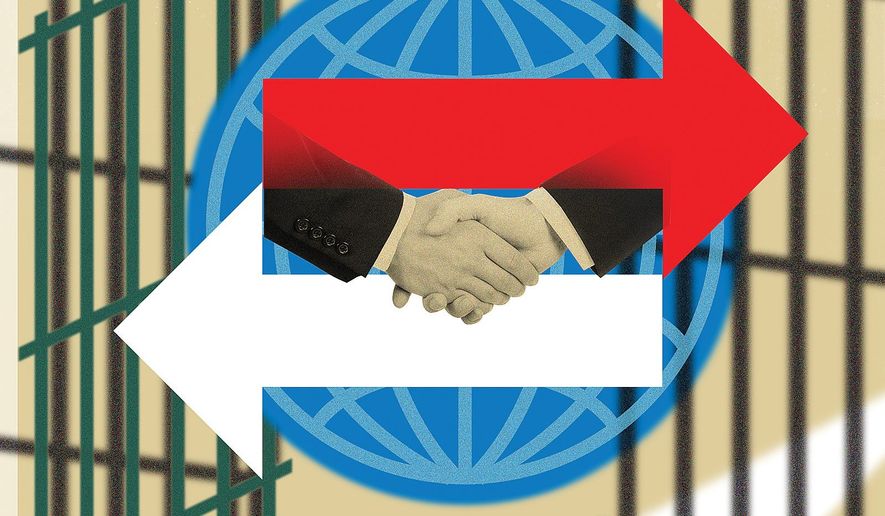OPINION:
The release of Pastor Andrew Brunson and his return home to the United States was an answer to the prayers of millions and the result of an administration that has reset our foreign policy by fearlessly engaging on issues that other administrations only talked about addressing.
Some might be hesitant to use the term reset as it pertains to U.S. foreign policy, but that is what the Trump administration has accomplished. They have especially reconfigured our approach as it relates to the well-being of Americans treated unjustly by foreign governments as hostages and by the recognition that religious freedom is a fundamental human right.
The images of Pastor Andrew Brunson sitting next to President Trump in the Oval Office, broadcast around the world less than 24 hours after he was released from Turkish custody, were the culmination of months of dogged diplomacy and fierce determination to see an American citizen come home.
But in my experience in working on behalf of victims of religious persecution with the administration, Mr. Trump’s team is motivated by more than humanitarian concerns, as significant as those concerns are. The administration is guided by an understanding that America seeks the well-being of its people at home and abroad, and that religious freedom is a universal human right.
Pastor Brunson, who had been an American missionary in Turkey for more than two decades, was arrested in October 2016 after a coup d’tat attempt against Turkish President Recep Tayyip Erdogan. Pastor Brunson was falsely accused by the Turkish government and held for more than a year without any formal charges. When hearings finally took place, nothing more than hearsay evidence was offered, yet the pastor remained in custody in declining health. Quiet and public diplomacy had failed.
But that was not the end of the story as the Trump administration took unprecedented steps to persuade Turkey to do the right thing and free Pastor Brunson, up to and including the president’s call for a plan to shutter the Turkish embassy if the pastor was not set free.
On Aug. 1, the U.S. Treasury imposed sanctions on two top Turkish officials involved in the arrest and detention of Pastor Brunson. Mr. Trump also authorized the doubling of tariffs on steel imported from Turkey. The actions by the United States triggered a further plunge of the Turkish lira, undermining the stability of the entire Turkish economy.
The unprecedented actions by President Trump sent an unequivocal message, not just to Turkey, but to the entire world that America will no longer sacrifice religious freedom and the well-being of Americans on the altar of globalism. This is of worldwide significance as 83 percent of all people live in places where religious freedom is either threatened or banned.
To address this international problem, the State Department held the first-ever Ministerial to Advance Religious Freedom the week of July 24, where Pastor Brunson’s plight was center stage. One day before Vice President Mike Pence’s address, Turkish officials announced that Pastor Brunson was being transferred to house arrest, one step closer to his ultimate release.
At that event before an audience of foreign ministers and leaders from around the world, Mr. Pence used his bully pulpit to make clear that moving him to house arrest wasn’t enough. In an uncharacteristically fiery tone, the vice president called on Turkey’s president to release Pastor Brunson or prepare for the United States to act.
Last week, I traveled to Turkey to meet with Pastor Brunson and attend his fourth hearing in my capacity as a commissioner with the U.S. Commission on International Religious Freedom. I saw the evidence that the strong, America-first message works.
The hearing was held at the Aliaga Justice and Prison Complex, about an hour from Izmir, in a converted gymnasium. The gymnasium was transformed into a courtroom after the 2016 coup attempt to accommodate the mass trials of hundreds of defendants at one time. The facility itself makes a mockery of the very concept of justice and would visibly contradict the Turkish court’s claim that their decision to open the prison door at the end of Pastor Brunson’s fourth hearing was the result of justice and the rule of law. Instead, it was more of a fear of an American administration that has reset America’s lead from behind foreign policy.
The message of America’s renewed commitment to religious freedom both here and abroad could not have been more clearly communicated than when Pastor Brunson knelt and prayed for President Trump in the Oval Office as the world watched. That is what it looks like when a nation respects the religious liberty of its citizens.
Earlier this year, Mr. Trump said, “Faith breathes life and hope into our world. We must diligently guard, preserve, and cherish this unalienable right.”
His commitment to that fundamental right went beyond mere words. The aggressive efforts of the Trump administration to help an American pastor imprisoned in Turkey had the effect of sending hope to the persecuted everywhere — a clear reset of America’s foreign policy from the previous administration.
• Tony Perkins is president of the Family Research Council and a commissioner on the U.S. Commission on International Religious Freedom (USCIRF). His views do not necessarily reflect the opinions of USCIRF.




Please read our comment policy before commenting.